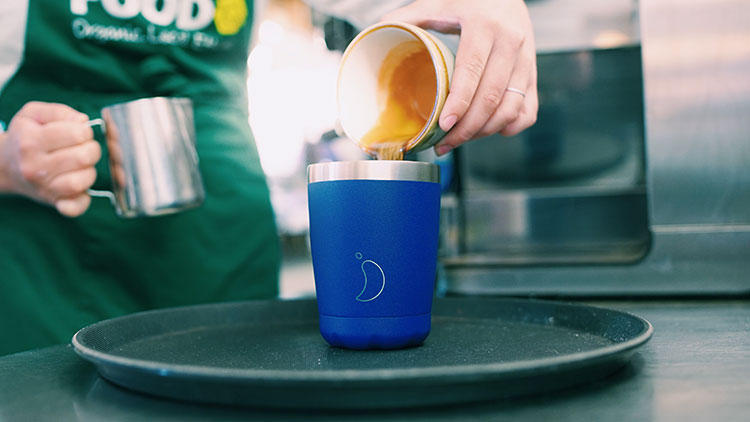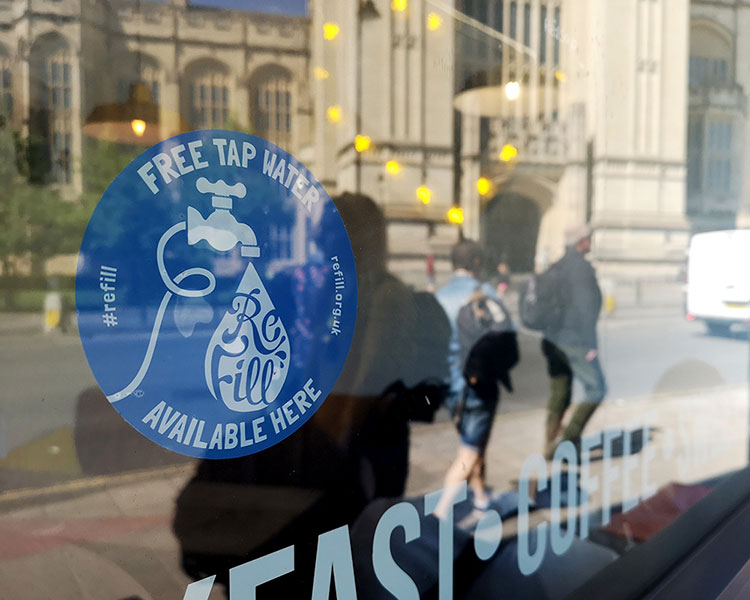This year Recycle Week runs from 21 to 27 September and is thanking the UK for continuing to recycle despite the challenges presented by the global COVID-19 pandemic.
To celebrate the organisations and individuals in the recycling sector who have continued to work hard despite the unprecedented difficulties encountered this year, this week we are publishing a new industry insight Q&A every day with those who are really making a difference.
Our previous interviews have included a kerbside recycling collector, an e-waste recycler, a plastics recycler and electronic reuse charity The Restart Project. Going higher up the waste hierarchy again, we have chosen to shine a light on another of the leading lights of reuse, City to Sea. Here is Jane Martin, Head of partnerships, to tell us more about the challenges City to Sea and their Refill campaign have been facing.
Who are City to Sea and what do you do?

City to Sea is an environmental not-for-profit organisation campaigning to stop plastic pollution at source. Our vision is a world where everyone connects their actions to the oceans so all life can thrive.
Our award-winning campaigns, like Refill, tackle the single-use plastic items most found on beaches and in rivers and oceans, from plastic bottles to coffee cups and period products. We inspire people and businesses to change their behaviour by developing simple and practical solutions to complicated systemic problems and encourage everyone to rethink, refuse, reduce and reuse.
For your organisation, what have been the biggest challenges in the last six months?
The global pandemic has unsurprisingly had a massive impact on our work and on so much of the progress made in tackling single-use plastics. We have witnessed dramatic changes to the food to go and retail landscapes where we operate our Refill campaign, connecting consumers with places to refill and reuse.
The coronavirus pandemic initially forced a complete shutdown of the sector, with only take-aways and home deliveries keeping businesses afloat. EAT – has closed permanently, with furlough winding down in October and the double whammy of a recession and Brexit on the horizon our high streets and businesses face challenging futures.
"There’s been lots of talk in the media about building back better, but we've seen worrying backsliding on policy and business operations during the pandemic, driving up unnecessary single-use plastic waste."
Policy makers have hesitated, the Government delayed the ban on single-use straws, stirrers and cotton buds from the end of April to October 2020, and businesses have gone into reverse on single-use plastic. As concerns around coronavirus took hold, the plastics industry has been working hard to convince us that single-use disposable plastic is the safest option, creating confusion and leading to many businesses banning reusables, and reverting to single-use plastic in outlet, citing protecting their staff and giving customers the confidence to return as just grounds.
Starbucks, along with most chains, publicly stopped accepting reusable cups back in March. Since then, at City to Sea, we’ve been working hard to get reusables back on the menu, launching a Reusables during COVID digital hub with advice and support for businesses in May. The good news is, over 120 scientists released a statement to say reusables pose no greater threat than disposables and with basic health and safety procedures in place they can be safely used.

Since then we’ve seen some progress, and both Costa and Starbucks have reversed the ban and are now accepting reusable cups and water bottles. Together with 15 other NGOs, we’re now calling on the remaining high-street chains and businesses across the UK, including Pret, Caffé Nero, Greggs and McDonald’s, to start accepting reusables again. Our 38 Degrees petition has been signed by over 17,000 people and continues to gain momentum.
"Another massive, and growing issue is the increase in PPE – or personal protective equipment that we’re now using in terrifying quantities and which is washing up on beaches around the world."
Has the ‘new normal’ presented any unforeseen opportunities for you?
Coronavirus provided a temporary hiatus in some damaging behaviours generating single-use plastic waste, there has been a 45% decrease in bottled water on-the-go sales. There is growing consumer and business appetite for a green recovery. People have reconnected with nature, 73% of respondents to our survey (OnePoll) agree the pandemic provides an opportunity to rebuild a greener economy and 61% would view a business that offered reusables more favourably.
As businesses have reopened a lack of clear guidance on how to operate reusables safely from government has led to our resources and campaigns on reusables reaching thousands of businesses and consumers looking for support.
In May we launched Contactless Coffee – a campaign to provide guidance for businesses in safely accepting hot drinks - and REPEAT, a Reuse Action Group (REPEAT) to bring together industry experts, scientists, businesses, retailers and epidemiologists to share best practice around operating reusables during coronavirus and where possible, solve issues, challenges and concerns around adopting reusables during COVID.
"By working together to galvanise our combined resource and expertise, we will create a positive step-change to ensure that when consumers take reusables to cafes and take-aways as they reopen, they are accepted and refilled."
City To Sea’s campaigns actively encourage businesses to #buildbackbetter, with tried and tested practical solutions, like Refill, supporting a circular economy and dramatically reducing the environmental impacts of businesses on the ground.
What does the future look like for your industry and what challenges lie ahead?
Our first challenge is to retake the ground that has been lost on single-use plastic during the pandemic, addressing the unfounded but understandable paranoia around transmission from packaging. For example, encouraging the use of reusable masks over single use plastic options and supporting our 30,000 high street Refill stations to return to offering free water refills.

In the future our industry will redesign delivery models using innovative technology to change citizen and business behaviours and stop the flow of single-use items from entering the waste stream altogether. We need to be cautious of false solutions such as bioplastics, or compostable plastics and other single-use alternatives which sustain our disposable single-use culture and are hindering much-needed progress away from single-use towards systems of reuse.
"This year City to Sea is expanding the award-winning Refill Campaign, connecting consumers to places to eat, drink and shop without pointless packaging."
Refill puts the power to reduce waste at your fingertips with a free app tapping into a global network of places to reuse and refill. Our long-term ambition is to make it easier than ever for people to live with less plastic and access refill and reuse options. We want carrying a reusable coffee cup and water bottle to be a social norm, and to inspire businesses to deliver their products without unnecessary and harmful plastic packaging. Many businesses offer opportunities to refill already, our work will take this to the mainstream.
What one piece of advice to improve recycling would you tell consumers today?
Over the last few years, it’s become increasingly clear that we can’t recycle ourselves out of our ongoing plastic problem. In fact, the current recycling system for plastics is one of the major contributors to plastic pollution around the world. By 2015 6 billion tonnes of plastic waste had been produced, but only 9% has ever been recycled! 79% of that has ended up in landfill or our natural environment, leaving the remaining 12% being incinerated.
We need to champion the waste hierarchy and rethink, reduce, reuse and refill before we think about recycling. At City to Sea, we’re committed to preventing plastic pollution at source – reducing the need for recycling by advocating reuse and providing practical alternatives to cut back on plastic.
And what advice would you give policy makers?
Government must step up and support systemic change to protect our wildlife and address the climate emergency. We expect the delayed legislation to be implemented this Autumn and encourage further policy and funding to be directed towards protecting our environment from the wasteful and damaging behaviors of big brands and businesses. Local councils tasked with managing this tidal wave of plastic have been hit by austerity and simply don’t have the resources to tackle the enormity of the task, the businesses creating the waste must contribute to the costs of managing it safely without exporting the problem to developing countries whose populations suffer as a result.
"Ultimately we need an overhaul of our recycling system to ensure it is consistent wherever you live in the UK and consumers understand the labelling – and businesses can’t hide behind meaningless jargon, greenwashing consumers into thinking just because something says recyclable it actually is recycled."
Tell us your favourite fact or myth to bust about recycling
It's not a favourite fact but it's an important one! Most people believe that putting their plastic in the recycling means it’s collected, sorted and turned into something new. That’s what we’re led to believe at least... In reality, our official plastic packaging recycling rate is just 39% – although research organisation, Eunomia believes the true figure is much lower. This means that more than 60% of all the plastic we use is ending up in landfill, incinerated – or worse, in our environment and oceans.
We actually only reprocess one third of our plastic recycling in the UK, so once plastic waste enters the system, it is sorted and then put up for sale on the international commodities market to be shipped around the world which means it is ending up in developing countries that just don’t have the infrastructure to deal with our waste.
So, think twice before putting your recycling out and see what you could swap for a reusable or refilling option instead! Visit the City to Sea site for our top tips to reducing single-use plastic.

Ben Luger
Marketing projects specialist
Ben joined the team at the beginning of 2015 and helps drive marketing communications and projects for Ecosurety, including project managing the launch of the Ecosurety Exploration Fund and website content development.

Latest News

Q2 2024 recycling data shows strong performance in H1
By Sam Marshall 24 Jul 2024
Ecosurety continue to step up for refill and reuse
By Victoria Baker 24 Jun 2024
Ecosurety renews B Corp™ certification with flying colours
By Louise Shellard 11 Jun 2024
Ecosurety sponsor the 2024 Carbon Literate Organisation Awards
By Louise Shellard 07 Jun 2024
